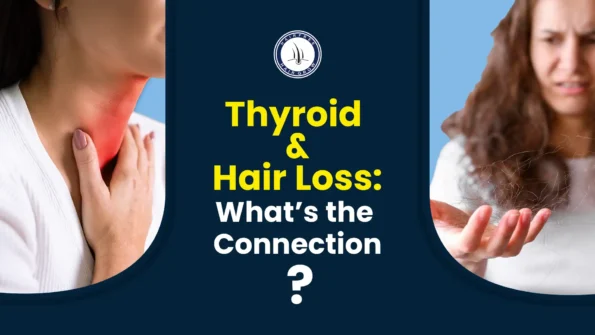Hair loss and thinning can be distressing, especially when linked to thyroid disorders. These issues are commonly experienced by those with thyroid problems. Cases of thyroid disorders have significantly increased, especially after the pandemic.
Thyroid and hair loss are closely connected, as the thyroid is a small endocrine gland located in the front of the neck, shaped like a butterfly, and it surrounds the windpipe. This gland secretes a hormone called thyroxine, which is crucial for the body’s metabolism.
In this blog, I’ll give you an overview of thyroid diseases, like hypothyroidism and hyperthyroidism, their treatments, and how they affect our body and hair.
Understanding the Thyroid Gland
The thyroid gland is responsible for secreting thyr6oxine (T4) and triiodothyronine (T3) hormones. T3 is the active form that regulates various functions in the body. These hormones are essential for the body’s energy consumption and overall metabolism.
Thyroid Dysfunction and Hair Loss
There are two main types of thyroid dysfunction: hyperthyroidism (overactive thyroid) and hypothyroidism (underactive thyroid). Interestingly, both conditions can lead to hair loss.
Hyperthyroidism (Overactive Thyroid)
When the thyroid is overactive, it produces too many hormones. This can speed up the body’s metabolism, causing symptoms like weight loss, rapid heartbeat, and anxiety. An overactive thyroid can also lead to hair becoming thin and brittle, resulting in hair loss.
Hypothyroidism (Underactive Thyroid)
When the thyroid is underactive, it doesn’t produce enough hormones. This can slow down the body’s metabolism, leading to symptoms like weight gain, fatigue, and depression. An underactive thyroid often results in hair loss, and a specific sign is the thinning of the outer third of the eyebrows.
Understanding the Connection Between Thyroid and Hair Loss
Thyroid disorders often result in hair problems like hair loss, hair thinning, and thinning of the eyebrows. Unfortunately, thyroid medications typically don’t address these hair issues. Let’s delve into why thyroid disorders cause hair loss.
Reasons for Hair Loss in Thyroid Disorders
Inflammation:
Hair follicles are very sensitive to inflammation. Thyroid disorders often involve high levels of underlying inflammation, which can damage hair follicles. Damaged follicles can’t grow new hair, and existing hair may become thin.
Thyroid Hormone Deficiency and Resistance:
Low thyroid hormone levels mean the body doesn’t get enough thyroid hormone consistently. Additionally, thyroid hormone resistance prevents the hormone from entering body cells, including hair follicle cells, inhibiting their function.
Nutritional Deficiencies:
Essential vitamins and minerals like zinc, selenium, and iron are crucial for hair production. Many people with thyroid disorders are deficient in these nutrients, leading to hair loss.
Improving Hair Health
To tackle hair issues related to thyroid disorders, you need a comprehensive approach. Here are some effective strategies:
1. Diet
Eliminate processed sugars (white sugar, brown sugar, honey, agave, maple syrup), fried foods, fast foods, gluten, and dairy. These can exacerbate thyroid and hair problems.
Consume Beneficial Foods:
- Green Leafy Vegetables provide iron, B vitamins, and antioxidants like quercetin, which are vital for hair health.
- Quality Protein Includes protein from vegetarian sources (lentils, beans, chia seeds, nuts, and seeds) and non-vegetarian sources (fatty fish, chicken, fish).
- Nuts and seeds like almonds, walnuts, chia seeds, and flaxseeds offer a valuable combination of omega-3 fatty acids, protein, and fiber, which benefit both your gut and hair health.
- Additionally, citrus fruits and berries, including oranges, lemons, limes, blueberries, and strawberries, are packed with antioxidants that are highly beneficial for your hair’s overall health.
2. Hair Care Routine
- Natural Hair Products: Use products free from chemicals to avoid damaging your hair and scalp.
- Avoid Hair Dyes: Many dyes contain harmful chemicals. Opt for natural alternatives if you need to color your hair.
- Regular Scalp Massages: Using oils like coconut oil can improve scalp circulation and hair health.
- Gentle Styling: Avoid tight braids, buns, or ponytails that stress hair follicles.
3. Stress Management
Practices like yoga, deep breathing exercises, and meditation can balance thyroid hormones and reduce hair loss.
4. Supplements
- Iron: Low iron levels are common in those with hair loss. Increase iron intake through food (green leafy vegetables, nuts, seeds, lentils, red meats) or supplements.
- Collagen Peptides: These support hair quality and contain amino acids beneficial for hair and gut health.
- Omega-3 Fatty Acids: These reduce inflammation and improve thyroid hormone function and utilization. Aim for 1000-2000 mg daily.
- Adrenal Supplements: Adaptogens like ashwagandha, Rhodiola, and holy basil support adrenal health, which is crucial for hair health.
- Biotin: Known as vitamin B7, biotin supports hair health but should be used in moderate amounts (around 1000 mg) to avoid interfering with thyroid tests.
Conclusion
Improving your hair health when dealing with thyroid disorders requires a multifaceted approach. By focusing on a healthy diet, natural hair care, stress management, and appropriate supplements, you can address hair loss and thinning effectively.
If you’re dealing with hair loss and looking for effective treatments, consider visiting HairFree and HairGrow Clinic today. Schedule a consultation and take the first step towards restoring both your hair and confidence with our top-tier hair transplant services.
Written By
MBBS, MD
Dr. Pratibha Pradhan is a hair restoration expert specializing in thyroid-related hair loss. With extensive experience, she offers personalized treatments to address the link between thyroid and hair loss, helping patients restore hair health and regain confidence.
Disclaimer
We’ve made all possible efforts to ensure that the information provided here is accurate, up-to-date and complete, however, it should not be treated as a substitute for professional medical advice, diagnosis or treatment. See Detailed Disclaimers Here.


